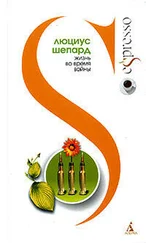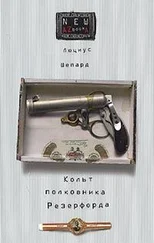“Where you going?” asked Witcover. “Let’s play.”
“No, thanks,” I said.
“Christ!” He picked up the discards and muttered something about sore losers.
“It’s not that,” I told him. “I’m worried if you win another hand, you’re gonna come all over the fuckin’ table. I don’t wanna watch.”
Fierman snorted laughter.
Witcover shot me an aggrieved look. “What’s with you, man? You been on my case ever since the hotel.”
I shrugged and headed for the door.
“Asshole,” he said half under his breath.
“What?” An angry flush numbed my face as I turned back.
He tried to project an expression of manly belligerence, but his eyes darted from side to side.
“Asshole?” I said. “Is that right?” I took a step toward him.
Fierman scrambled up, knocking over his chair, and began pushing me away. “C’mon,” he said. “It’s not worth it. Chill out.” His boozy sincerity acted to diminish my anger, and I let him urge me out the door.
The night was moonless, with a few stars showing low on the horizon; the spiky crowns of the palms ringing the village were silhouettes pinned onto a lesser blackness. It was so humid, it felt like you could spoon in the air. I crossed the dirt road, found a patch of grass near the tin-roofed building, and sat down. The door to the building was cracked, spilling a diagonal of white radiance onto the ground, and I had the notion that there was no machine inside, only a mystic boil of whiteness emanating from Tuu’s silky hair. A couple of soldiers walked past and nodded to me; they paused a few feet farther along to light cigarettes, which proceeded to brighten and fade with the regularity of tiny beacons.
Crickets sawed, frogs chirred, and listening to them, smelling the odor of sweet rot from the jungle, I thought about a similar night when I’d been stationed at Phnoc Vinh, about a party we’d had with a company of artillery. There had been a barbecue pit and iced beer and our CO had given special permission for whores to come on the base. It had been a great party; in fact, those days at Phnoc Vinh had been the best time of the war for me. The artillery company had had this terrific cook, and on movie nights he’d make doughnuts. Jesus, I’d loved those doughnuts! They’d tasted like home, like peace. I’d kick back and munch a doughnut and watch the bullshit movie, and it was almost like being in my own living room, watching the tube. Trouble was, Phnoc Vinh had softened me up, and after three weeks, when we’d been airlifted to Quan Loi, which was constantly under mortar and rocket fire, I’d nearly gotten my ass blown off.
Footsteps behind me. Startled, I turned and saw what looked to be a disembodied white shirt floating toward me. I came to one knee, convinced for the moment that some other ghost had been lured to the machine; but a second later a complete figure emerged from the dark: Tuu. Without a word, he sat crosslegged beside me. He was smoking a cigarette…or so I thought until I caught a whiff of marijuana. He took a deep drag, the coal illuminating his placid features, and offered me the joint. I hesitated, not wanting to be pals; but tempted by the smell, I accepted it, biting back a smartass remark about Marxist permissiveness. It was good shit. I could feel the smoke twisting through me, finding out all my hollow places. I handed it back, but he made a gesture of warding it off, and after a brief silence he said, “What do you think about all this, Mr. Puleo?”
“About Stoner?”
“Yes.”
“I think”—I jetted smoke from my nostrils—“it’s crap that you’ve got him penned up in that astral tiger cage.”
“Had this discovery been made in the United States,” he said, “the circumstances would be no different. Humane considerations—if, indeed, they apply—would have low priority.”
“Maybe,” I said. “It’s still crap.”
“Why? Do you believe Stoner is unhappy?”
“Don’t you?” I had another hit. It was very good shit. The ground seemed to have a pulse. “Ghosts are by nature unhappy.”
“Then you know what a ghost is?”
“Not hardly. But I figure unhappy’s part of it.” The roach was getting too hot; I took a final hit and flipped it away. “How ’bout you? You believe that garbage you preached this mornin’?”
His laugh was soft and cultivated. “That was a press release. However, my actual opinion is neither less absurd-sounding nor more verifiable.”
“And what’s that?”
He plucked a blade of grass, twiddled it. “I believe a ghost is a quality that dies in a man long before he experiences physical death. Something that has grown acclimated to death and thus survives the body. It might be love or an ambition. An element of character… Anything.” He regarded me with his lips pursed. “I have such a ghost within me. As do you, Mr. Puleo. My ghost senses yours.”
The theory was as harebrained as his others, but I wasn’t able to deny it. I knew he was partly right, that a moral filament had snapped inside me during the war and since that time I had lacked the ingredient necessary to the development of a generous soul. Now it seemed that I could feel that lack as a restless presence straining against my flesh. The sawing of the crickets intensified, and I had a rush of paranoia, wondering if Tuu was fucking with my head. Then, moods shifting at the chemical mercies of the dope, my paranoia eroded and Tuu snapped into focus for me…or at least his ghost did. He had, I recalled, written poetry prior to the war, and I thought I saw the features of that lost poet melting up from his face: a dreamy fellow given to watching petals fall and contemplating the moon’s reflection. I closed my eyes, trying to get a grip. This was the best dope I’d ever smoked. Commie Pink, pure buds of the revolution.
“Are you worried about tomorrow?” Tuu asked.
“Should I be?”
“I can only tell you what I did before—no one has been harmed.”
“What happened during those other experiments?” I asked.
“Very little, really. Stoner approached each subject, spoke to them. Then he lost interest and wandered off.”
“Spoke to them? Could they hear him?”
“Faintly. However, considering his reaction to you, I wouldn’t be surprised if you could hear him quite well.”
I wasn’t thrilled by that prospect. Having to look at Stoner was bad enough. I thought about the eerie shit he might say: admonitory pronouncements, sad questions, windy vowels gusting from his strange depths. Tuu said something and had to repeat it to snap me out of my reverie. He asked how it felt to be back in Vietnam, and without forethought, I said it wasn’t a problem.
“And the first time you were here,” he said, an edge to his voice. “Was that a problem?”
“What are you gettin’ at?”
“I noticed in your records that you were awarded a Silver Star.”
“Yeah?”
“You must have been a good soldier. I wondered if you might not have found a calling in war.”
“If you’re askin’ what I think about the war,” I said, getting pissed, “I don’t make judgments about it. It was a torment for me, nothing more. Its geopolitical consequences, cultural effects, they’re irrelevant to me… maybe they’re ultimately irrelevant. Though I doubt you’d agree.”
“We may agree more than you suspect.” He sighed pensively. “For both of us, apparently, the war was a passion. In your case, an agonizing one. In mine, while there was also agony, it was essentially a love affair with revolution, with the idea of revolution. And as with all great passions, what was most alluring was not the object of passion but the new depth of my own feelings. Thus I was blind to the realities underlying it. Now”—he waved at the sky, the trees—“now I inhabit those realities and I am not as much in love as once I was. Yet no matter how extreme my disillusionment, the passion continues. I want it to continue. I need the significance with which it imbues my past actions.” He studied me. “Isn’t that how it is for you? You say war was a torment, but don’t you find those days empowering?”
Читать дальше






